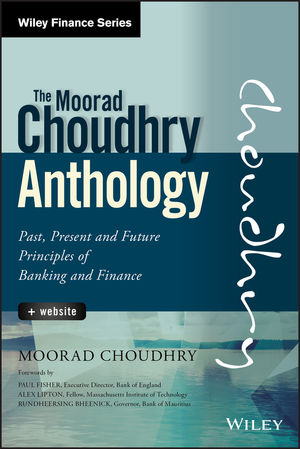Praised as the definitive and timeless guide to the principles of banking and finance, addressing and meeting the challenges of competition, strategy, regulation and the digital age, the Moorad Choudhry Anthology compiles the best of renowned author and professor of the same name. It covers the developments and principles of banking from the 1950s to today. On this basis, the book outlines the author’s recommended best practices in all aspects of bank strategy, governance and risk management, including asset-liability management, liquidity risk management, capital planning, Treasury risk, and corporate framework, and describes a “vision of the future” with respect to a sustainable bank business model. Jochen Heussner spoke to him about his book, the future of banking and why you should choose a career in finance only for one reason.
Beginnings
When someone writes 17 finance books in 14 years, you automatically wonder what drives such a passion for writing. That’s why it was all the more surprising when Moorad Choudhry told me that he never really had this in mind and that it all started more by coincidence. He stumbled into the art of writing when he was made redundant at the bank he was working for and to cover the period between jobs did a couple of training courses for his professional association, which in turn asked him whether he had ever thought of turning the course companion into a book. From this first book he simply continued writing since, as he put it, “when I was a bond trader every time I read a text book I found that every time I read it I didn’t learn anything, so I wanted to write a book about what actually happens” as there is a big difference writing about banking when you have worked in a bank or not. From the beginning of his journey from bonds he followed up with derivatives to several other aspects of financial markets and services. The Anthology is a combination of some of these past writings with new material and presents his proposal of best practices to modern banking, covering everything from strategy and customer service to asset-liability management and corporate governance. With more than 1,200 pages it might not be considered the obvious choice as a quick reference to help the reader right away. However, its language that is unlike many other reference books pleasant and understandable makes it a good read and guarantees that you can always learn something every time you pick it up.
The only reason to pursue a Career in Finance
Other than a financial practitioner and author, he also teaches at Kent Business School and has been teaching for many years. Thus, he’s in a perfect position to judge whether there has been a change in the attractiveness of finance especially following the Financial Crisis of 2007/2008. Choudhry describes how when he first entered the market almost 30 years ago, it was another job and working in the City was a respectable career to get into and how over the following ten, fifteen years it started to attract people who were more obsessed with money. It would attract the best students who were attracted by the prospects of six-figure salaries in a short amount of time rather than the people who were motivated by the right thing. Following the big crash of 2008 he sees more people being drawn towards FinTech or more generally technology based careers. And while it is still seen as an attractive career option for many, he thinks that with any luck it is attracting less people that are less attracted by money, which, of course, caused a lot of the excesses leading up to the Global Financial Crisis.
The Right Thing
When I asked him to describe further what he meant by motivated by the right thing, he explained that rather than chasing the money in banking people should be driven by the desire to do a good job looking after the customer regardless whether it is an individual or a corporation, to make sure that the end outcome is always beneficial to the customer, which clearly has not been the case before the crisis and to an extent even after. He also expressed his hope that culture was changing but that it would take time and couldn’t be achieved quickly. The onerous regulation that has been put in place in the last years certainly helps with creating the necessary framework, especially considering the personal liability of decision makers in case of mismanagement, but at the end of the day culture is not something you can legislate, he adds. Eventually very onerous regulation can be counterproductive as well, however, as Choudhry explained, pointing to the time and resources needed to comply with these rules.
The Role of Compliance
So, what should be the role of Compliance in this, I asked him, since rules cannot alone drive behaviour? His answer was simple: Compliance is very important to enforce the right framework, but while ensuring the right behaviour it needs to work with the business as after all, the entire bank and its functions depend on the business it makes. Compliance – and in particular with the growing costs of compliance over the last years in mind – cannot be done for the sake of compliance, i.e. a tick box exercise that creates its own, enormous industry, but should be tried to be built within the minds of every bank employee. Or as Choudhry put it, “ large numbers of compliance staff as a percentage of the total staff, than you’re not necessarily heading in the right direction culture wise compared to having a fit for purpose compliance department”. However, this was easier said than done as currently so much management time is done in just meeting the needs of the regulator, so that he believes that continuous overburdening regulations don’t benefit anybody. Instead, we would need to see management being able to focus more on increasing the efficiency of organisations and delivering great customer service.
The Future of Finance
Talking about customer service, the importance of putting the client at the centre of his customer business model of a good bank is a key element of Choudhry’s book. When we spoke about what the bank of the future would look like he was less concerned about the disappearance of bank branches as there should always be a place for them for certain business banks. While the online only challenger banks will have their place the future of banks isn’t exclusively one or the other but rather an application of multidimensional customer service point and making customer interaction possible depending on the different needs of clients.
Neither does the entrance of the big tech firms into financial services spell the end for traditional banks in his view: “When Amazon and Google become banks, they will also need to become a little bit more like banks because of the regulation they will have to comply with.” For banks in turn however it means to get better at what Big Tech does well, i.e. the use of artificial intelligence, to really understand each customer and serve them better. Hence, the future is much better use of technology and understanding the customer better at an individual level. Or to put it simple: “At the end of the people want to feel like they are a customer and not a number.”


